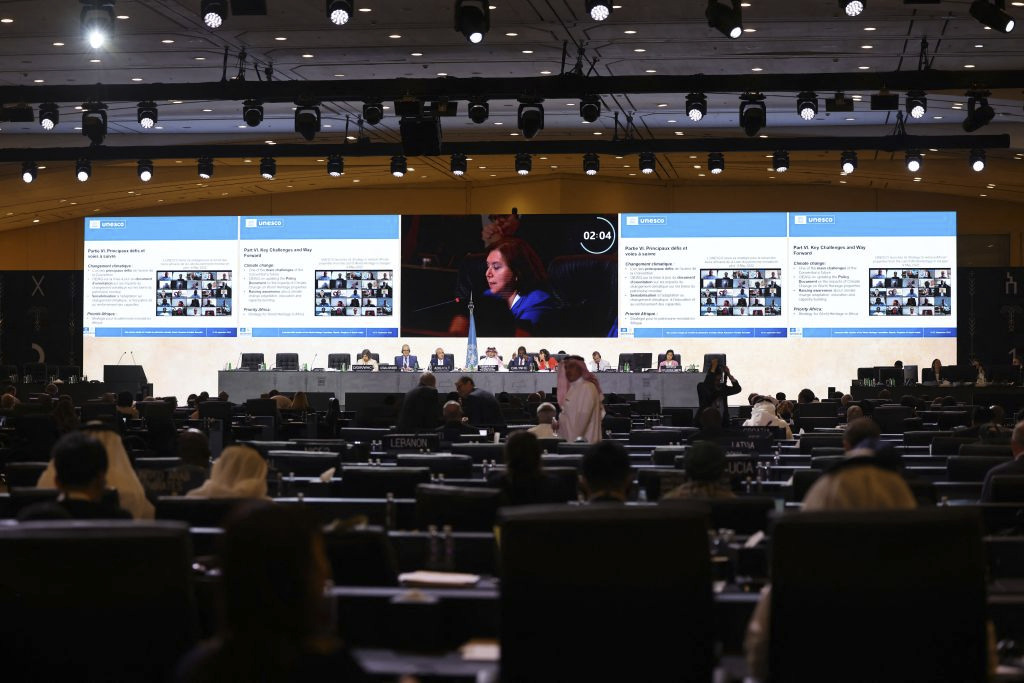
Most people know the United Nations Educational, Scientific and Cultural Organization (UNESCO) through its eponymous and popular designation of UNESCO World Heritage Sites. By UNESCO's own definition, "World Heritage sites belong to all the peoples of the world, irrespective of the territory on which they are located." But an impending late-September vote by UNESCO again calls into question whether the organization holds to its stated beliefs or fits into the broader pattern of anti-Israel bias that permeates the United Nations.
The clear bias of the UN against the State of Israel was on full display in 2022. The UN General Assembly passed 28 resolutions criticizing countries. Of these resolutions, 15 criticized Israel, while only 13 were critical of all the other countries around the world combined. In a world beset by conflict, with a war in Ukraine, genocide against the Uyghurs in China, violence in Myanmar, the Taliban horrors in Afghanistan, instability in the Sahel, military infighting in the Sudan, and gang violence in Haiti, among the many global hotspots, Israel being the primary focus of UN criticism is totally inappropriate.
The Biden administration correctly highlighted this bias early on. In 2021, U.S. Ambassador to the UN Linda Thomas-Greenfield, addressing the UN Security Council, stated:
"Israelis also shared with me their concern that the United Nations is intrinsically biased against Israel. They interpret the overwhelming focus on Israel in this body as a denial of Israel's right to exist and an unfair focus on this one country – and they are correct."
Given the bias evidenced in the UN General Assembly and at the UN Security Council, it should not come as a surprise to find anti-Israel bias at other UN organizations such as UNESCO. In one of the latest examples, UNESCO recently announced it will vote on whether to designate the city of Jericho as a "Palestinian" heritage site. This is a clear attack on Christians and Jews, who also view the city as an important part of their cultural and religious history. The Biden administration should object to this designation and protest UNESCO's clear bias strongly.
In addition, as former U.S. Ambassador to the UN and former National Security Advisor John Bolton advised in his strong article, "Biden's foolish rush to rejoin UNESCO has nothing to do with China": "Congress should firmly block any UNESCO funding, as it has consistently done."
In 2017, UNESCO designated the city of Hebron as a "Palestinian World Heritage site." As part of the Hebron designation, UNESCO labeled the Ibrahimi Mosque, also known as the Tomb of the Patriarchs, as a site being "at risk." Designating a site as "at risk" is meant to highlight a concern that sites are in danger of damage, and maybe even loss. The U.S. objected to the "at risk" designation, noting it called into question the seriousness of such assessments.
The Tomb of the Patriarchs is the burial site of Abraham, Isaac, and Jacob and a site that is holy to Muslims, Christians and Jews alike. Given that the location is revered by all three religions, the specificity of the designation was a clear affront to Christians and Jews who also hold the site as sacred.
UNESCO's actions only serve to further inflame tensions in the area. Whether it is the 2017 Hebron designations or the more recent plan to designate Jericho, the moves clearly go against UNESCO's own stated mission:
"UNESCO's mission is to contribute to the building of a culture of peace, the eradication of poverty, sustainable development and intercultural dialogue through education, the sciences, culture, communication and information."
Let us put emphasis on the first part of that mission, "to contribute to the building of a culture of peace." Creating turmoil over sites like Jericho and Hebron does exactly the opposite. It transforms these historical sites into political footballs and even sites of violence. Rather than highlighting the opportunity for these major faiths — Islam, Judaism, and Christianity — to work together to honor and preserve these important locations, UNESCO has put these sites into the crosshairs of today's political disagreements. Rather than building a culture of peace, it is perpetuating a culture of anger and division.
The U.S. has responded in the past to the blatant politically divisive positions of the UN and UNESCO and the Biden administration should consider doing the same. In 1984, President Ronald Reagan withdrew the U.S. from UNESCO because of its political bias and perceived mismanagement. The U.S. and Israel stopped financing UNESCO after it voted to include "Palestine" as a member state in 2011. In 2017, President Donald Trump filed notice that the U.S. was quitting UNESCO because of its anti-Israel bias, a move that became effective in 2019.
President Joe Biden made the poorly-timed decision to rejoin UNESCO in July 2023. Given the pending vote by UNESCO regarding Jericho becoming a "Palestinian heritage site," the Biden administration should reconsider its decision to rejoin the organization. This is an in-your-face decision by UNESCO to the U.S. that will only increase tensions and undercut the very foundation of UNESCO's mission. By exiting UNESCO again, the U.S. would send a clear message that it will not tolerate the organization's anti-Israel bias and that it will stand up to other racist and anti-Semitic actions at the UN.
Peter Hoekstra is a Distinguished Senior Fellow at Gatestone Institute. He was US Ambassador to the Netherlands during the Trump administration. He also served 18 years in the U.S. House of Representatives representing the Second District of Michigan and served as Chairman and Ranking Member of the House Intelligence Committee.


